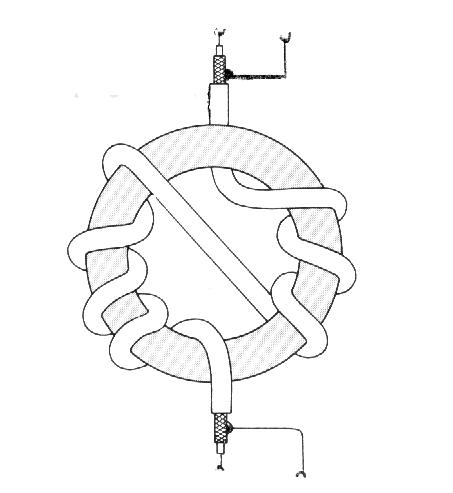----------------------------------------------------------
HB9ABX update 3.Aug.04, 5.4.05, 16.4.05, 18.4.05, 14.6.05, ... 12.10.05

This is a 50 Ohm 1:1 balun and serves perfectly to feed
a symmetric antenna with a coax,
or to be inserted into a coax to prevent
shield current and feedline radiation.
Insertion point is just
at the antenna feed
point.
.
Explanation: What is a current balun
?
Measurements of current baluns
Broadband current balun 1,8-30 MHz:
1.Version: for 100
Watt:
-
Ferrite ring FT140-43 with
RG58
(or FT114-43 with coax RG174, ok for
100W)
1 ring is sufficient, by using 2, the
efficiency on 1,8 MHz will increase
you will need 2 rings for 200 W
and RG 316.
With 2 rings, you place one over the other and make common
windings through both.
In contrast to the picture: make on the left
and on the right side each 4.5 (or 5.5) turns!
(better is
teflon coax RG316)
2. Version: for 1 Kilowatt:
-
Ferrite ring FT240-43 with coax
RG58
(better is teflon coax RG142)
Winding technique is
important!
With coax from outside to the ferrite ring. Wind 4 1/2 turns on
one
half of the ring, then through the ring to the other side and
wind
again 4 1/2 turns.
The end of the winding should then be on the
opposite position
of the beginning of the winding. (See picture).
Then,
fix the winding with PVC tape.
Static
discharge
If the antenna has no connection to
ground,
add a small 10 K resistor between center conductor
and braid of
the coax to discharge static electricity.
This prevents "tac-tac" from
statics.
Finally, place the balun into a weatherproof
housing.
If the enclosure is metallic, make sure that the input
ground
connection is not shorted to the output ground connection
by using
isolated connectors.
This type of balun is more efficient than the
W2DU design,
where a number of ferrite rings is pushed over the coax cable.
It is also the better choice than winding the coax cable in a loop of
several turns.